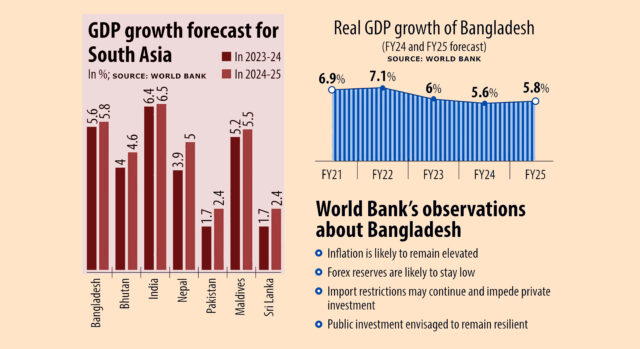Despite prevailing economic challenges and global uncertainties, Bangladesh is poised to achieve the second-highest GDP growth in South Asia for the fiscal year 2023-24, according to the latest report from the World Bank’s Global Economic Prospects.
The forecast projects Bangladesh’s gross domestic product expansion to reach 5.6 percent in the current fiscal year, marking a slowdown from previous years but still positioning the country ahead of its regional counterparts. India is the only country expected to outpace Bangladesh in GDP growth for FY24.
The Bangladeshi government has revised its initial GDP growth target downward to 6.5 percent for FY24, acknowledging persistent factors such as import restrictions, elevated material and energy costs, and external pressures. The Finance Ministry emphasizes that their primary focus this fiscal year is to contain inflation and bolster foreign currency reserves.
Inflation remains a concern, with headline inflation averaging 9.02 percent in FY23, the highest in over a decade. The World Bank anticipates that inflationary pressures will continue to weigh on private consumption in Bangladesh.
Foreign exchange reserves, currently standing at $20.38 billion, have faced a sharp decline in the past two years, posing macroeconomic challenges. Import restrictions are expected to persist, impeding private investment. However, public investment is projected to remain resilient.
Globally, the World Bank highlights a deceleration in the world economy, projecting the slowest half-decade of GDP growth in 30 years. Developing economies are expected to grow at 3.9 percent, over one percentage point below the previous decade’s average.
The report emphasizes that geopolitical tensions could pose near-term hazards for the world economy. While the risk of a global recession has receded, the medium-term outlook has darkened for many developing economies, including those in South Asia.
The World Bank report cautions that slower-than-anticipated growth in Bangladesh’s export destinations, particularly in the European Union, could pose a risk to the country’s growth prospects. With China being Bangladesh’s largest trading partner and the EU accounting for more than 46 percent of export receipts in FY23, external factors remain critical to Bangladesh’s economic performance.



















